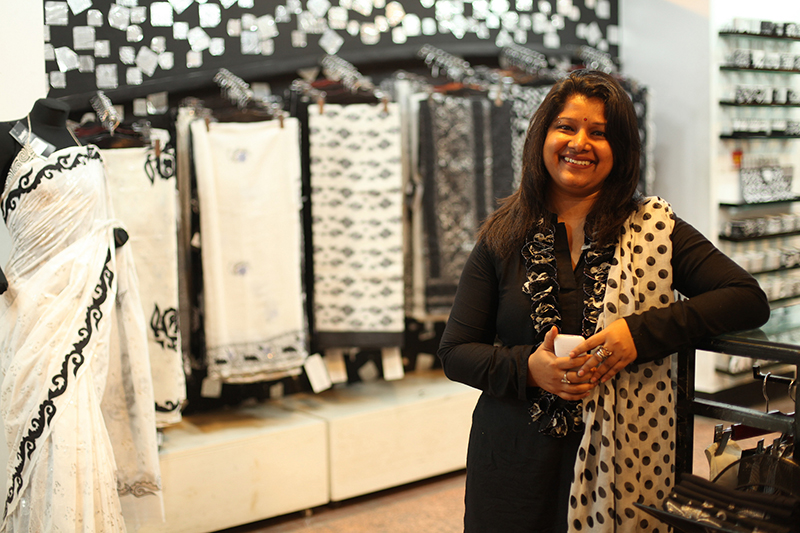 Shaheen is an owner of a leading fashion house in Dhaka, Bangladesh. For the private sector, investing in women is one of the best ways to create shared value. Photo by: Asian Development Bank / CC BY-NC-ND
Shaheen is an owner of a leading fashion house in Dhaka, Bangladesh. For the private sector, investing in women is one of the best ways to create shared value. Photo by: Asian Development Bank / CC BY-NC-ND
The push to advance women’s economic empowerment around the world is not a fashionable procurement exercise. It is not a way for governments, private sector investors or implementing partners such as FHI 360 to look good. It is necessary and urgent. It is a lifeline to women, families, communities and countries struggling with health and food security, environmental degradation, economic growth barriers and political turmoil.
Economic empowerment is a universal human right that protects women and people of all genders and social identities from sexual harassment, exploitation and gender-based violence.
Investing in women’s organizations and businesses
Development practitioners, donors, investors and policymakers need to really listen to the people who are most affected when it comes to women’s economic empowerment and equality, or WE3. Although we want to advance the cause and we want to listen, we are not in a good place to do so. One reason: lack of sufficient investment in women’s organizations and businesses worldwide.
The Association of Women’s Rights in Development conducted a global survey in 2010 that revealed that the median budget for 740 women’s organizations is only $20,000. Women worldwide are also losing out in leadership positions, making up only 11.6 percent of chief financial officers in 2013’s Fortune 500 companies. Women hold only 22.8 percent of positions in national parliaments and make up less than 5 percent of mayors worldwide.
Representatives from companies such as Wal-Mart and Ernst & Young, and connectors such as Shamarukh Mohiuddin from the U.S. Chamber of Commerce Foundation, helped frame this issue from a private sector perspective.
Many companies embrace a “shared values perspective” when it comes to supporting women’s leadership development, capacity building and overall entrepreneurship. Paraphrasing Mohiuddin, WE3 does not just make a company look good. It also empowers key consumer segments and supports better retention. One dollar invested in women’s leadership and skills is worth a $3 return.
Emerging solutions
Women’s labor networks and community farming and land rights networks have tapped into a solution. Although it will take time — and blood, sweat and tears — what works is investing in and fully partnering with women’s social movements and businesses.
Here are three ideas to make WE3 a reality.
1. Make smart investments in women’s businesses. Evidence from the private sector is demonstrating how investments in women’s businesses bring strong returns. We need to create a business model for investing in women’s businesses and organizations that becomes a driving force in global economic trends.
One way is to support the U.N. Women’s Empowerment Principles and the 650-plus companies that have signed up for those principles. Our purchasing power and social media presence can make it clear that corporate investments in women are in demand.
2. Move toward real development partnerships with women’s organizations. One of the greatest potentials for significantly shifting how foreign aid is implemented is to engage women’s organizations as true partners.
We must identify and create WE3 champions among implementing partners and contractors who invest in and nurture these partnerships, including budgeting for and allocating time to design projects, building capacity as subcontractors and future prime contractors, improving financial management and audit procedures, and helping women’s organizations to understand donor criteria and contract language. We should ensure that women’s organizations have a larger piece of the funding pie, with substantive and appropriate budgets, support systems, and autonomy to carry out agreed-upon scopes of work.
3. Collaborate with women’s organizations. To engage women’s organizations, movements and networks, we must participate in the global conversations where they are present and invite them to the discussions and strategic planning sessions that we host. Global women’s networks, such as Women in the Informal Economy: Globalizing and Organizing, and women’s funding networks, such as the Global Fund for Women, have knowledge, experience and organizing power. We need to make sure that we are all at the same table working toward common solutions.
No economic or educational output will be sufficient until we enable women to claim what has always been duly theirs: equal power. Women need power to shape their lives and the world around them. Let’s work on listening to, investing in and partnering with women’s movements. It will shift the economic power balance toward equality and improve lives for women and their families, communities and countries for generations to come.
Elise Young serves as senior adviser, gender mainstreaming and thought leadership at FHI 360.


